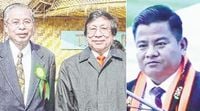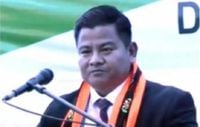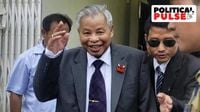In a significant turn of events for the National Socialist Council of Nagalim (NSCN-IM), Ikato Chishi Swu, the son of the late co-founder Isak Chishi Swu, has announced his departure from the group, citing rampant corruption and moral decay within its leadership. This shocking announcement, made on April 18, 2025, has raised questions about the future of Naga sovereignty and the ongoing peace process with the Indian government.
Ikato’s decision to leave NSCN-IM comes nearly nine years after his father’s passing in 2016, a time during which he claims the organization has strayed from its founding principles. In a bold statement, he expressed his disillusionment with the current leadership, stating, "The virus of corruption has infected all organs of the NSCN/GPRN government because of mismanagement and top leadership’s moral decay." He accused senior leaders of engaging in unethical practices, including selling positions within the organization and involvement in illegal liquor syndicates.
Ikato’s departure is not just a personal decision; it marks a significant shift in the Naga political landscape. He has reportedly joined forces with Myanmar-based leaders H.S. Ramsan and Absalom Raman, both of whom are known for their hardline stance on the Naga political issue and their commitment to armed struggle. This alliance is seen as a revival of the Naga National Council’s principles across the border, potentially leading to the formation of a new resistance bloc.
Historically, Isak Chishi Swu was a pivotal figure in Nagaland’s political history. He co-founded NSCN in 1980, rejecting the 1975 Shillong Accord and playing a critical role in brokering the 1997 ceasefire with the Indian government. His vision for Nagalim was not just geographic but also a spiritually sovereign homeland for the Naga people. However, Ikato’s recent comments suggest that this vision is now at risk, with the NSCN-IM facing a credibility crisis.
Ikato’s allegations of corruption within the NSCN-IM leadership have sparked a political storm in Nagaland. He lamented that the movement started by his father had devolved into a "business empire," disconnected from the ideals of sacrifice and self-rule for the Naga people. His departure, accompanied by at least 22 armed cadres, signals a formal split that could have far-reaching implications for the Naga peace process.
Insiders within NSCN-IM have reported a state of "internal panic" following Ikato’s announcement. The leadership has yet to issue an official response, but there are indications of growing dissatisfaction among rank-and-file members. This internal strife is compounded by the fact that Ikato’s departure could exacerbate existing tensions within the organization, particularly as younger cadres look for leadership that aligns more closely with Isak Swu’s original vision.
Moreover, Ikato’s alliance with Ramsan and Raman poses a challenge to the NSCN-IM’s credibility among the Naga populace, particularly as the leadership is predominantly from the Tangkhul tribe, while Ikato represents the Sumi tribe. This dynamic raises questions about the inclusivity and unity of the Naga movement, which has historically sought to represent the interests of various tribes within the region.
As the Naga peace process continues, Ikato’s departure could have significant implications for negotiations with the Indian government. The Framework Agreement signed in 2015, which aimed to resolve the 76-year-old Naga conflict, has faced delays, largely due to NSCN-IM’s insistence on the recognition of the Naga flag and constitutional provisions. With Ikato’s exit and the potential rise of a new faction, the Indian government may need to reassess its approach to peace talks.
Ikato has been vocal about his disappointment regarding the handling of peace talks since the ceasefire was established in 1997. He accused the Indian government of backtracking on the Framework Agreement, stating, "I see no future and no solution to the Naga issue under the present leadership." His remarks highlight a growing frustration among Naga leaders regarding the slow progress in achieving a lasting resolution to the conflict.
In light of these developments, stakeholders in Nagaland are urged to monitor the situation closely. Observers should keep an eye on statements from NSCN-IM leadership regarding the split, track movements along the India-Myanmar border, and anticipate potential shifts in the dynamics of the Naga peace process. Civil society groups may also need to step in to mediate and de-escalate potential conflicts arising from this internal rift.
The implications of Ikato Chishi Swu’s departure from NSCN-IM are profound, not only for the organization itself but also for the broader Naga community. As the struggle for Naga sovereignty continues, the question remains: will Isak Swu’s dream of a united and sovereign Nagalim be revived or further fragmented?





